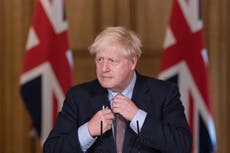Internal Market Bill: ‘Rule of law is under attack,’ lawyers say after MPs approve Brexit plans
‘We have a choice about what sort of country we want to be,’ Law Society says
The rule of law is “under attack” in Britain, lawyers have said after MPs voted for a bill that violates international legislation.
The Law Society, which represents 200,000 solicitors in England and Wales, said the UK Internal Market Bill would damage the country’s global standing.
“The rule of law is under attack,” said president Simon Davis. “It is because of our commitment to the rule of law that our system of justice is respected globally, that countries want to do trade deals with the UK and that we can comment on state oppression in Belarus with credibility.
“We have a choice about what sort of country we want to be and what we want to be known for around the world. I fervently hope we will still be respected as a country which prides itself on upholding the rule of law.”
Despite dissent from some prominent Conservatives, MPs voted to move the law onto its next stage by 340 to 263 on Monday evening.
Two Tory MPs – Sir Roger Gale and Andrew Percy – voted against the bill, while 30 did not cast a vote although some may have been “paired” with opposition MPs.
Boris Johnson said the legislation was necessary to prevent the EU taking an “extreme and unreasonable” interpretation of the provisions in the withdrawal agreement relating to Northern Ireland.
But some senior Conservatives, as well as all five living former prime ministers, raised concern after ministers admitted that the bill breached international law.
Ed Miliband, Labour’s shadow business secretary, questioned why the prime minister and government had backed the withdrawal agreement if it contained the issues described, adding: “A competent government would never have entered into a binding agreement with provisions it could not live with."

MPs will begin detailed line-by-line scrutiny of the bill on Tuesday, with votes expected next week on amendments to the Northern Ireland provisions which some Tories may back.
In a detailed briefing sent to politicians before Monday’s vote, the Law Society and Bar Council, which regulates barristers in England and Wales, had called for the removal of five clauses of the bill.
The document said the provisions enable ministers to derogate from the UK’s obligations under international law and prohibit public bodies from complying themselves.
“They represent a direct challenge to the rule of law, which include the country’s obligations under public international law,” it added.
“There will be implications on the reputation of the UK around the world as a country with which to do business. This will be of global and long-term effect, particularly in the context of the ongoing negotiations with the EU and with other countries.
“The slightest threat could damage the rule of law and the perception of the UK as a credible and predictable trade partner, as well as the UK’s position as a centre for international legal practice and dispute resolution, and the global use of English law.”
The briefing said the bill threatened the UK’s aim to accede to the Lugano Convention, which enables civil judicial cooperation with EU countries, at the end of the Brexit transition period.
The Law Society and Bar Council said there was “no justification for the proposed measures”.
Priti Patel, the home secretary, defended the need for the legislation, telling broadcasters the government was standing by the union on Tuesday morning.
She told BBC Breakfast: “When it comes to preserving the integrity of the UK and clearly delivering for the people of Northern Ireland when it comes to the Good Friday Agreement, we've said from day one ... that we would always stand by our word and not compromise when it comes to unfettered access in goods and services but also standing by the Good Friday Agreement.
“We are ensuring the UK Internal Market Bill stays true to that principle, that is why we are bringing this bill forward.”
Join our commenting forum
Join thought-provoking conversations, follow other Independent readers and see their replies
Comments




Bookmark popover
Removed from bookmarks